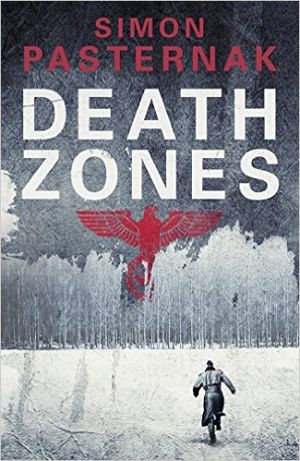
Translated by Martin Aitken — This bleak novel is set towards the end of World War II, as the Nazi offensive in Russia stalls amidst terrible fighting and enormous military and civilian casualties. SS Oberleutnant Heinrich Hoffman is a detective with the German police in occupied Belorussia. He does not appear to be a fanatical Nazi and his discomfort with some of the army’s actions, particularly those of the SS, is obvious. His greatest wish is to leave the Eastern Front as quickly as possible and to be reunited with his fiancée Eline in Hamburg, who happens to be the sister of his SS-Obergruppenfuhrer Manfred.
In the excellent first scene of the novel Hoffman is seen grappling with a difficult problem. The SS officers in the area are totally corrupt, and it is common practice for them to skim the profits arising from the ghetto workshops in their jurisdictions. It is equally common for them to protect certain Jews, perhaps because they are from the family of a mistress or because they are artists or musicians. A drunken argument between two SS officers descends into personal insults and climaxes with one shooting a favoured worker of the other. The facts of the case are absolutely clear, and held to any reasonable moral code, it would be murder. However, no such rules apply. Hoffman is essentially being asked to adjudicate a dispute between two SS officers since the German army is totally disinterested in the fate of the Jewish man. Getting the answer wrong could have fatal consequences for Hoffman, who is ultimately just a policeman.
With this first scene, Pasternak begins to explore some of the themes that are central to Death Zones. How can Hoffman police those above the law? As in other novels set in a totalitarian environment, the detective’s position is absurd, even impossible. By accepting the situation, is he, even though ostensibly a good man, complicit in any wrongdoing that comes about? Resigning from his post would probably see him sent to the front and a likely death. Furthermore, nothing would change. So what degree of personal sacrifice is necessary for a good man to maintain his honour? Is any degree of compromise acceptable in such circumstances?
Hoffman knows that whichever verdict he reaches, one SS officer will be unhappy. His solution is to upset the officer who can hurt him least, the one who is shortly to be transferred out of the area. Pasternak invites us to form our own conclusions.
Following on from this, the narrative of Death Zones follows Hoffman’s investigation into the murders of a visiting SS general and his actress wife. His entourage appears to have been ambushed by local resistance fighters. His wife lies dead by their car, and General Steiner is discovered in a nearby barn, having been gelded before being shot through the chest. The only surviving witness seems to be a young girl who is in shock. To Hoffman it is obvious that Steiner is a casualty of war and that this is a matter for the army. But Steiner was a mentor to Hoffman’s superior, Manfred, who demands he investigate the murders as civilian crimes. Should Hoffman fail, the consequences for him will be most severe.
The girl is able to provide a partial description of the men who killed Steiner. They spoke Polish, wore scarves around their faces, but one had a crude tattoo of a cockerel on his back. Hoffman is able to discover the tattoo was likely done in prison and indicates the man is a homosexual and would have been used as a sex slave by other inmates. He heads to Minsk, to search Russian records for Jewish homosexual inmates meeting the man’s description, but his investigation is hampered by the chaos of war, the practicalities of the German retreat, and Manfred’s personal interference.
Death Zones is as much a modern day morality play as it is historical thriller or procedural. Manfred seeks at every turn to corrupt Hoffman, repeatedly forcing him to become complicit in SS atrocities. Hoffman’s letters home to Eline reveal his internal struggle to do the right thing and become increasingly desperate as he finds himself ever more entangled with her brother. In the end, his final attempt to free himself from Manfred’s malign influence cannot bring him salvation.
I couldn’t read Death Zones without thinking of Philip Kerr’s Bernie Gunther series. That represents a very high bar for comparison, and Kerr has a greater facility for, and I suspect appreciation of, the classic mystery form. He has also has the advantage of building up Gunther over a series, whereas Pasternak is saying what he needs to in one novel.
Death Zones exists at the very edge of genre fiction, and is about as far from a holiday read as it is possible to get. There are some extremely bleak and upsetting scenes in the book, and in recent memory only Don Winslow in The Power of the Dog and The Cartel has written such violence so unflinchingly. Given the subject matter, though, this is appropriate and Winslow is good company to be in.
Take a peek at our Bernie Gunther primer, here. Death Zones is released 28 April.
Harvill Secker
Print/Kindle
£9.99
CFL Rating: 4 Stars










Thanks for this review. I bought this book on the strength of it being a big Philip Kerr fan as well. Pasternak book is also in similar territory to Ostland by David Thomas (aka Tom Cain).